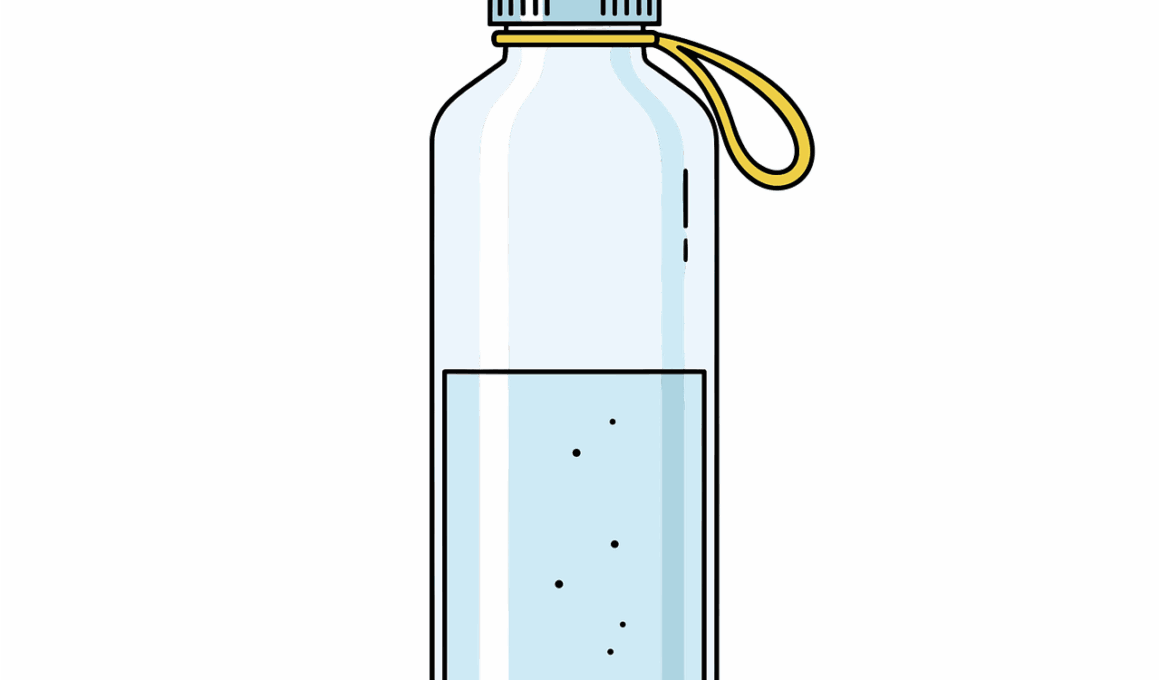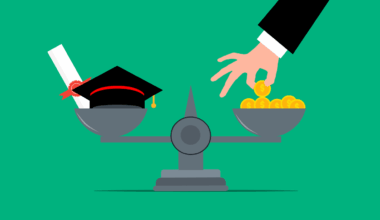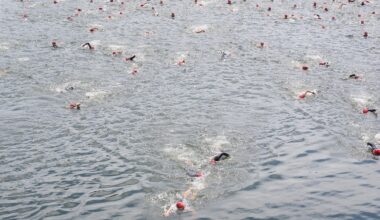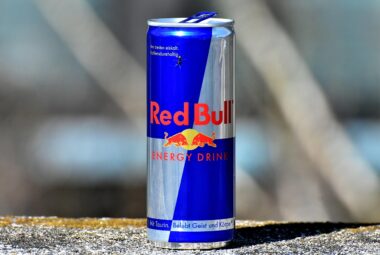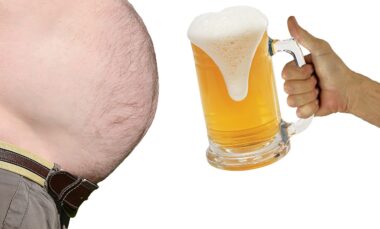Hydration Myths in Sports: How Much Water Do You Actually Need?
Debunking hydration myths in sports nutrition is essential for athletes. One common myth is that everyone needs eight glasses of water a day. The truth is that hydration needs vary significantly based on individual factors. Some people may require more fluids, while others may need less. Factors include body size, activity level, and climate. Athletes participating in intense training or competitions can lose significant water through sweat. To maintain performance levels, they must replace this lost fluid. Understanding how much water you need starts with recognizing your body’s unique requirements. For athletes, daily hydration must be calculated based on several criteria. A good rule is to drink enough to maintain urine that is light yellow in color. This often indicates adequate hydration levels. In addition to water, electrolytes play a crucial role in maintaining hydration. Sports drinks may be beneficial during intense workouts, as they help replace lost electrolytes. Rather than focusing solely on water intake, consider personal needs for optimal performance. Knowing your hydration needs can dramatically enhance endurance and overall fitness. Therefore, always listen to your body and respond accordingly.
Another hydration myth suggests drinking water only when thirsty. While thirst indicates need for fluid, it’s not a reliable signal for athletes. Waiting until you feel thirsty can result in dehydration, ultimately impacting performance. Athletes should proactively hydrate before, during, and after exercising. Developing a consistent hydration strategy is essential for maintaining peak performance. Additionally, some sports nutrition experts recommend consuming fluids even when not feeling thirsty, especially during prolonged workouts. Setting reminders to drink can help foster this habit. Moreover, electrolyte drinks can be important if exercise lasts longer than an hour. These drinks support hydration and maintain electrolyte balance. Many athletes choose to consume specialized sports drinks to fuel their bodies effectively. Educating yourself on when to hydrate will help improve stamina and focus during workouts. It’s crucial for those engaging in intense training to listen to their bodies while adhering to a planned hydration protocol. They must determine their individual needs and adapt accordingly. Overall, establishing a structured hydration plan allows athletes to improve performance and sustain energy levels during competition.
How Hydration Affects Performance
Hydration plays a critical role in athletic performance. When athletes become dehydrated, it can lead to reduced endurance, increased fatigue, and even impaired cognitive function. Studies show that even a loss of 2% of body weight due to dehydration can adversely affect performance. Keeping hydration levels steady ensures that muscles receive adequate blood flow and nutrients. Lack of hydration may also affect thermoregulation, vital for maintaining core body temperature during physical exertion. Therefore, athletes must prioritize fluid intake to enhance both physical and mental performance. Regularly monitoring hydration levels during training is a good practice. One simple method is checking body weight before and after workouts to determine fluid losses. Additionally, tracking urine color provides a quick gauge of hydration status. Athletes should also consider their environment. Heat and humidity can further increase fluid needs, emphasizing the importance of continuous hydration. Staying on top of hydration needs becomes increasingly vital for performance optimization. Lastly, developing a plan that incorporates hydration into training routines allows for better preparation for competitions. Essentials include water, electrolyte drinks, and mindful hydration practices.
Another common myth is that consuming large amounts of water will prevent dehydration. This misconception can lead athletes to believe that simply drinking excessive amounts of water can keep them hydrated. However, excessive intake without proper electrolyte balance can lead to a condition known as hyponatremia, where sodium levels in the blood become dangerously low. This condition can cause serious health issues and potentially be life-threatening. It’s crucial for athletes to not only drink water but also replenish electrolytes lost through sweat. Proper hydration involves a balanced approach that includes both fluids and crucial minerals like sodium, potassium, and magnesium. Incorporating foods rich in these minerals can aid hydration as well. Athletes should regularly assess their hydration strategies, considering factors like duration and intensity of exercise when planning fluid intake. Engaging with sports nutritionists can help in formulating hydration plans tailored specifically to individual needs, ensuring optimal performance without compromising health. This balanced focus will keep athletes performing at their best while safeguarding their health. Maintain fluid intake strategies that align with personal activity levels for safety and performance.
Timing Your Hydration
Effective hydration includes not just how much to drink, but when to drink as well. Athletes must recognize the importance of timing their fluid intake. Hydrating before workouts is vital for optimal energy levels during exercise. It’s recommended to drink water or a sports drink about two hours before physical activities. This practice allows the body to efficiently absorb fluids and electrolytes. During exercise, ongoing hydration becomes equally critical, especially if the workout surpasses an hour in duration. Continuous small sips of water or electrolyte beverages can help maintain performance and stave off fatigue. Moreover, post-exercise rehydration is crucial as well. Following workouts, athletes should consume fluids to replace lost water and recover effectively. Implementing a post-exercise hydration strategy will facilitate quicker recovery times. Additionally, balancing fluid intake during and after workouts prepares the body for the next training session. Using these hydration strategies generally enhances overall physical performance. Athletes can count on carefully timing their fluid intake as part of their nutrition plan. Overall awareness of hydration timing significantly contributes to improved athletic performance and recovery.
While many recognize hydration’s importance, choosing the right fluids remains another prevalent myth. Some athletes assume that any drink can adequately hydrate them, overlooking whether specific beverages are beneficial. Sugary sodas, caffeinated drinks, and energy drinks can potentially worsen hydration. Caffeine and added sugars can lead to dehydration, impacting overall performance levels. Instead, water is typically the best choice for hydration due to its purity and effectiveness. When engaging in longer bouts of intense exercise, sports drinks designed with electrolytes are recommended. These drinks help maintain the electrolyte balance lost through sweating. Athletes should also consider fluid preferences during training, as enjoyable beverages might encourage higher intake. Establishing hydration preferences allows athletes to create a personalized hydration plan contributing to success over time. This exploration into what types of fluids work best can facilitate proper hydration levels. Consulting with a nutritionist can provide insight into effective hydration strategies customized for individual needs. Recognizing the difference in hydration efficacy among beverages fosters more informed choices. Proper hydration requires discernment in selecting fluids that support overall athletic pursuits.
Conclusion: The Path to Optimal Hydration
In conclusion, hydration is a cornerstone of sports nutrition critical to enhancing athletic performance. Rather than adhering to a one-size-fits-all approach, athletes need to consider personal needs. Dispelling common myths helps in adopting strategies that effectively combat dehydration. Understanding factors like fluid requirements during workouts and the timing of intake is equally important. Athletes must implement practices that ensure proper hydration without succumbing to misconceptions. Additionally, the right beverage choices play a role in maintaining hydration balance effectively. Rather than just focusing on water intake, athletes should think about electrolytes and timing crucial for optimal results. Overall, developing a customized hydration plan can substantially boost performance. Encouraging awareness around personal hydration needs fosters better outcomes. Listening to one’s body while systematically tracking fluid intake can lead to improved endurance and stability during intense activities. Athletes who actively engage in these hydration practices are more likely to outperform others. By prioritizing hydration education and creating plans accordingly, athletes can pave the way to success in their sporting endeavors. Emphasizing hydration as an ongoing priority will cultivate better performance in sports and overall health.
